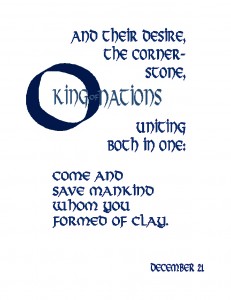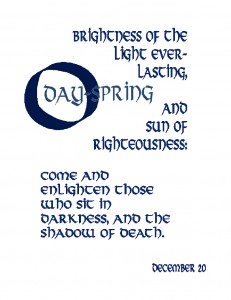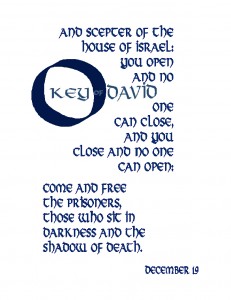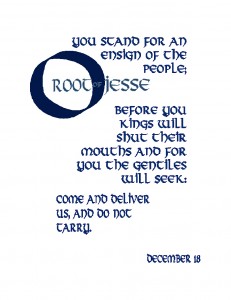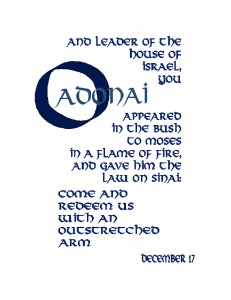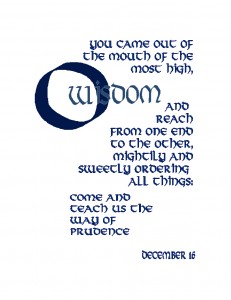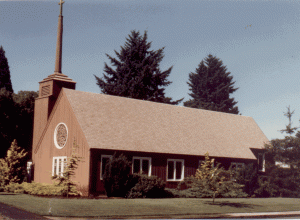|
Eons ago, when scarce I knew the lode was true, Midst darkest tunnels discovering The Lode was deep and wide and true; For miner’s heart still stirs, DeepLight Anchorhold
|
In medieval times, an anchorite made his or her vows, and was often sealed up inside a small room attached to the side of a church. I have joked that I could not find a church willing to have me! Truth be told, I didn’t look for one. Rather, both my bishop and I knew that my vocation was truly as an anchorite of the whole diocese, and the cloister walls of my anchorhold consisted of the tall firs and cedars surrounding my small house situated in a quiet neighborhood a few miles out of town.
As a priest, my community of peers was that of the clergy, and my bishop asked that I make my vows during the Holy Week liturgy for the reaffirmation of ordination vows, and the consecration of the Chrism, the oil used in baptism. Drawing on the ancient tradition of monastic vows and the enclosing of anchorites and the blessing of hermits, (see especially The Hermits and Anchorites of England), I wrote my portion of the liturgy, which was then integrated into the larger form. The final combined liturgy may be seen here: Vows of an Anchorite.
Monastic rules are generally written for purposes of inspiring and governing a community–when and where and how to pray, describing the nature of the ministry of the community, who makes the decisions, who does the dishes, who takes out the garbage, who cares for the sick and the guests, who settles the quarrels….you get the idea.
Historically, many hermits and anchorites have lived under the Rules of the monasteries to which they were attached, with exceptions to the rules for their particular circumstances; others have been directly under the authority of their local bishop. And there have been yet others who were, well, simply solitary. Such persons may or may not have had a formal rule.
In my own situation, while not being attached to any monastery or religious community, but rather making my vows directly to my bishop, I chose to draft my own rule as a contemporary expression of the eremetic tradition. It may be viewed here: Anchorite Rule
Lex orandi, lex credendi
“As we pray, so we believe”
I was born into a peculiar family. I don’t think I had a lot of choice in the matter, or at least I don’t remember God consulting the soul that became Susan whether or not she wanted to be born, and grow up, and work, and cry, and laugh, and fight, and pray, and love, and finally die in this family. But here I am—our name was Episcopal, and to this day I still bear that name.
The first party my family gave after I was born was small and quiet—it was wartime, and not everyone could be there. But it was a good party, and I even got to wear a special white dress for the party. Everybody smiled and laughed a lot—especially when I cried a bit after getting so wet on my head. They didn’t seem to know that I was just surprised, and had really thought the water felt cool and fresh and clean and life-giving.
The next big party I remember my family giving was quite a long time later. Again I got to wear a new dress, but this time before the party I had to go to classes several weeks, and study a small book, and learn to recite some things by heart. Now, I said for my own self, that I would—
“…renounce the devil and all his works, the pomps and vanity of this wicked world, and all the sinful lusts of the flesh; believe all the Articles of the Christian Faith; and keep God’s holy will and commandments, and walk in the same all the days of my life.”
At thirteen, I wasn’t all that sure what the “devil, pomps, and vanity” were, nor was I very clear at all what keeping God’s will would entail for a lifetime, but it all somehow felt right, and the believing part seemed not to be so hard (I was good at memorizing) and before too long I could say, “I believe…”, and “Our Father…”, and “Thou shalt not…” quite easily. I really wasn’t too sure what they all meant, but that didn’t seem to matter a lot at the time. I did have to ask my Grandma what “One, Holy, Catholic” meant (she said “universal”) as I had friends who were Catholic, and I was pretty sure that wasn’t us! But I knew I wanted to take this next step; I knew I wanted to belong to this family, and the family all said this was what I did to belong. So I came to the party, and recited “Thou shalt not…” and “I believe…” and “Our Father…”. And this time, instead of getting wet, my forehead was anointed with oil, and the bishop laid hands on my head. I was old enough to know not to cry out, but my tummy was turning over, and my head was spinning, and I knew something big had happened.
Then a long time passed, and I went out into the world to begin my own life’s journey. But this family of mine seemed to be in lots of places, so I joined a branch of the family wherever I was and went to their parties. They prayed the same prayers, and sang the same music, and had the same rituals, and wore similar clothes, so I knew I must belong. Here, I really began to listen to what we were singing, and saying, and doing. And I found more things to memorize by heart, but these seemed to be easier, almost as if I already knew them—
Almighty and most merciful Father; We have erred and strayed from thy ways like lost sheep. We have followed too much the devices and desires of our own hearts. We have offended against thy holy laws. We have left undone those things which we ought to have done; and we have done those things which we ought not to have done; and there is no health in us. But thou, O Lord, have mercy upon us, miserable offenders. Spare thou those, O God, who confess their faults. Restore thou those who are penitent; According to thy promises declared unto mankind In Christ Jesus our Lord. And grant, O most merciful Father, for his sake; That we may hereafter live a godly, righteous, and sober life, To the glory of thy holy Name. Amen.
And—
O Come, let us sing unto the Lord; * let us heartily rejoice in the strength of our salvation. / Let us come before his presence with thanksgiving; * and show ourselves glad in him with psalms….
And of course—
Almighty God, Father of all mercies, we, thine unworthy servants, do give thee most humble and hearty thanks for all thy goodness and loving kindness to us, and to all men; We bless thee for our creation, preservation, and all the blessings of this life; but above all, for thine inestimable love in the redemption of the world by our Lord Jesus Christ; for the means of grace, and for the hope of glory. And, we beseech thee, give us that due sense of all thy mercies, that our hearts may be unfeignedly thankful; and that we show forth thy praise, not only with our lips, but in our lives, by giving up our selves to thy service, and by walking before thee in holiness and righteousness all our days; through Jesus Christ our Lord, to whom, with thee and the Holy Ghost, be all honour and glory, world with end. Amen.
Years passed, and no matter where I went I found some of my family. At one time, I visited some far distant cousins calling themselves Methodists—they taught me about Jesus’ humanity, but I was glad to return to the grandeur and mystery of my Episcopal family, where I knew I found Christ’s divinity.
The 1960’s and 70’s came along, and our family was stretched thin by war and justice issues. But we kept praying—
Almighty God, unto whom all hearts are open, all desires known, and from whom no secrets are hid: Cleanse the thoughts of our hearts by the inspiration of thy Holy Spirit, that we may perfectly love thee, and worthily magnify thy holy Name; through Christ our Lord. Amen.
And—
Almighty God, Father of our Lord Jesus Christ, Maker of all things, Judge of all men; We acknowledge and bewail our manifold sins and wickedness, Which we, from time to time, most grievously have committed, By thought, word and deed, Against thy Divine Majesty, Provoking most justly thy wrath and indignation against us. We do earnestly repent, And are heartily sorry for these our misdoings; The remembrance of them is grievous unto us; The burden of them is intolerable. Have mercy upon us, Have mercy upon us, most merciful Father; For thy Son our Lord Jesus Christ’s sake, Forgive us all that is past; And grant that we may ever hereafter Serve and please thee In newness of life, To the honour and glory of thy Name; Through Jesus Christ our Lord. Amen.
Above all, we prayed—
All glory be unto thee, Almighty God, our heavenly Father, for that thou, of thy tender mercy, didst give thine only Son Jesus Christ to suffer death upon the Cross for our redemption; who made there (by his one oblation of himself once offered) a full, perfect, and sufficient sacrifice, oblation, and satisfaction, for the sins of the whole world; and did institute and in his holy Gospel command us to continue a perpetual memory of that his precious death and sacrifice, until his coming again: For in the night in which he was betrayed, he took Bread; and when he had given thanks, he brake it, and gave it to his disciples, saying Take, eat, this is my Body, which is given for you; Do this in remembrance of me. Likewise, after supper, he took the Cup; and when he had given thanks, he gave it to them, saying, Drink ye all of this; for this is my Blood of the New Testament, which is shed for you, and for many, for the remission of sins. Do this, as oft as ye shall drink it, in remembrance of me…
And quietly, before coming to the sacred meal—
We do not presume to come to this thy Table, O merciful Lord, trusting in our own righteousness, but in thy manifold and great mercies. We are not worthy so as much as to gather up the crumbs under thy Table. But thou art the same Lord, whose property is always to have mercy: Grant us therefore, gracious Lord, so to eat the flesh of thy dear Son Jesus Christ, and to drink his blood, that our sinful bodies may be made clean by his body, and our souls washed through his most precious blood, and that we may evermore dwell in him, and he in us. Amen.
With the 1970’s, I met some new parts of the family, those who felt, at best, like shirttail relatives. Many of them didn’t even know the same songs I knew, and their parties were very, very, very different. But they claimed to be part of the same family, so I hung around for a while, as they sang their lively songs and gave fervent prayers with hands raised high. They said they “knew Jesus,” were “born again,” and “spoke in tongues”, and had been “baptized by the Holy Spirit.” Often in close alliance with them was the healing ministry, which appeared to be grounded in a deeper intellectual integrity than the charismatics often were, and offered physical and spiritual healing with the laying-on-of-hands, and sometimes even the “exorcism of demons” and “gifts of prophecy.” Encounters with many of these distant cousins deepened my faith, and gave it new expressions and I began to discover a deeper longing to find a way to serve the Lord.
At about the same time, Vatican II was opening wide the windows of the Roman Catholic Church in unexpected ways, and our Episcopal family began to look at our own family traditions—and began work toward a revision of the Book of Common Prayer. For we always say—
“As we pray, so we believe”
So from mimeographed handouts through the Green Book, the Zebra Book, and the Blue Book versions we somehow managed to pray our way to the 1979 revision, changing “thee” and “thou” to “you”, and “men” to “all people”, as we tried to retain the elegance of Cranmer’s 16th Century English while lurching into “contemporary idiom.” “Communion” became “Eucharist,” Morning Prayer was relegated to early services or 5th Sundays, the exchange of the “Peace”—profound and beautiful as is its intent—all too often became a noisy and chaotic interruption between Word and Sacrament. And of course we pulled the altar out from the wall, with the priest now facing the people—that gave us a deeper sense of the incarnate Jesus, but that awe-full mystery of the transcendent and resurrected Christ seemed to become less visible, less powerful, less present.
“As we pray, so we believe”
About the same time of all the liturgical changes, a retired elder of the family gave me a little book about some of the family ancestors. So I began to read the Desert Fathers, and about Gregory of Nyssa, and Athanasius’ Life of St. Anthony. A Russian Orthodox woman I met in England taught me the Jesus Prayer, told me of the mystical life, and introduced me to Teresa of Avila and John of the Cross. My soul recognized my spiritual home immediately. Now, I heard God calling even more clearly: “I have other need of you.” But there were no job descriptions for mystics in the classifieds.
So I talked to the bishop, and he sent me to seminary. There, in an all-too-brief three years, we skated through three thousand years of biblical and ecclesiastical history, theology, ethics, pastoral ministry and contemporary issues, all the while learning to flip pages of the Prayer Book and Hymnal, construct liturgy according to the rubrics, and preside at the Offices and Sacraments. My bishop told me to deal with periods of spiritual aridity by simply saying prayers when I could not pray, but neither he nor seminary nor spiritual directors gave me any tools for deepening prayer within my own soul—or for helping others do the same.
“As we pray, so we believe”
Yet the heart would not be denied, and so as a newly ordained deacon I entered monastic life which seemed to be the part of the family most like me. Now, plainchant was balm to my soul, even in contemporary English forms.
Phos Hilaron
O gracious Light,
pure brightness of the everliving Father in Heaven,
O Jesus Christ, holy and blessed!
Now as we come to the setting of the sun,
and our eyes behold the vesper light,
we sing your praises, O God: Father, Son, and Holy Spirit.
You are worthy at all times to be praised by happy voices,
O Son of God, O Giver of life,
and to be glorified through all the worlds.
(Vespers Canticle)
And the ancient canticles and antiphons, sung by the ancestors down through the ages—
Arise, shine, for your light has come, *
And the glory of the Lord has dawned upon you.
For behold, darkness covers the land; *
Deep gloom enshrouds the peoples….
(Tuesday Vespers)
And—
O Virgin of virgins, how shall this be?
For neither before you was there any seen like you,
Nor shall there be after.
Daughters of Jerusalem, why do you marvel at me?
The thing which you behold is a divine mystery.
(Antiphon on the Magnificat, December 23)
It was glorious. The chant fed my soul, bringing me to the silence of the heart in a way nothing else ever had.
But whenever you pray, go into your room and shut the door and pray to your Father who is in secret; and your Father who sees in secret will reward you. (Matthew 6:5)
Yes, I was still “saying prayers”, but I knew there was something deeper. So I prayed in my solitary cell, all the while knowing Jesus most likely did not mean a literal shutting the door on a literal room. But no one could tell me how to find that inner room, or how to go into it, or how to shut the door.
“As we pray, so we believe”
In later years while I went out into the family doing parish and other ministry, I continued to “say prayers” and teach others how to do the same. At last count, (forgive me—I used to be a statistician!) over the course of more than 30 years, I have said prayers (both Offices and Sacraments) in 15 dioceses and 171 congregations, monasteries, retreat houses, homes, hospitals, mortuaries, and hermitages—even once in a hotel room in Kiev, Ukraine. Nor does that include my explorations of very far-flung family branches in the Celtic and shamanic traditions, which at least seemed to take more seriously the reality of Spirit than we often do in our set liturgical forms. Nor does it include the prayer groups and bible study groups I’ve led and attended, nor most of the classes, seminars, and retreats I’ve led, attended, enjoyed, hated, sat through, or fled from. Yes, I have “said prayers.”
“As we pray, so we believe”
All the while, I have watched—and often participated in—as this beloved Episcopal family struggled year after year, decade after decade with one plan, program, endeavor, or emphasis after another. We have fought, and continue to fight, our way through resolutions and financial crises, through sexual conduct and misconduct, through wartime and peace, through civil rights, women’s rights, gay rights, environmental causes, and gun control. We have set up listening commissions, task forces, committees, and study groups. We have reorganized ourselves at parish, convocation, area, diocesan, provincial, and national and international levels. We have redefined ministry to include women, and now gays and lesbians; we have told the laity they were the true ministers, and to find their own ministry, which all too often had the covert (or sometimes explicit) intention as ministry which brought more people in the door on Sunday. We have mounted massive capital expenditure campaigns to build new churches, or renovate old ones, and we have cut funding for campus ministry and education. We have named and renamed our newspapers, cutting their budgets and then hiring more staff.
The Evangelicals have fought the Liberals and the Broad Church; the Charismatics have joined the Evangelicals or the Baptists. The Anglo Catholics seem to have scattered into all three parties, or sometimes joined the Roman Catholics, or the Orthodox, or even the Assembly of God. The Liberals have held their ground, or joined the Unitarians or the New Age. We’ve worn ourselves out on ecumenical dialogues with the Romans and the confessing churches, and we’ve linked up with the Lutherans in a (sometimes uneasy) alliance.
“As we pray, so we believe”
We have “said prayers” through it all. And I have no doubt that many, many of us have prayed in a multitude of deeper ways as well. We have believed in the way we prayed, and we have acted in the way we believed.
Some years back, I could no longer pretend—I did not truly fit in this family; and “saying prayers” was no longer sufficient. It really never had been for me. My first bishop had also told me to let the faith of the church carry me when I had no faith. I had done just that for a very, very long time. But no longer. Even my own prayers, study, and rituals no longer sustained me. I could only do what countless Christians have down over the ages before me—go into the desert.
“As we pray, so we believe”
Loving the Church no less than did the earliest monastics of the third and fourth centuries, I, too, heard God’s call. It was a call to seek the Kingdom of God within—to seek it not in accommodation to the values, mores, and traditions of the wider culture, but to return to the most primitive teachings. I needed to learn to pray, not simply “say prayers.” I needed to learn the deeper meaning of the Gospels, not simply the latest theological theories. Above all, I wanted to find my way to God, not simply continue to find ways to fit into, and serve this family of ours, this family called the Episcopal Church.
So that’s what I’m doing. Hiding away in a hermitage that looks like a very ordinary house, in a very ordinary neighborhood. And learning that all those years of saying prayers and serving the Church wherever she called me was an integral part of God’s call—yet less than God. And I’m at last learning to pray, learning to find my way to God, now with solitary chant and silence, and meditation, learning to not only find the Kingdom of God within my own soul, but to know that as I find my own soul, I find God. And they are one.
“As we pray, so we believe”
If the church splits over the present controversy, I do not know what part might still claim me as a member of the family. I am neither Evangelical nor Liberal, Charismatic nor Broad Church. I am neither a fundamentalist nor a humanist. I still believe I hold the faith of the One, Holy, Catholic Church—Catholic in the sense my Grandmother taught me—universal; Holy in the most sacred sense that is beyond our understanding or defining; and One in the sense that God is One.
I am simply someone who was born into this Ecclesiastical Peculiar called Anglicanism, someone who has served its declared needs faithfully for many years, someone who loves it…and someone who must stay apart nearly all the time in order to find God. I am still a member of this family. I will remain a member of this family. I love it deeply and I pray for it always. I am sad to witness its present agony, and to see that the present events may well mean a fracturing of the family. I hurt for it. But I do not stop loving it. Or being a part of it in my own unique way. And I know that if there is a fracture, that, too, is ultimately in accord with the will of God.
For after all, what truly matters? Keeping the so-called family tree intact, or remembering what our most distant ancestors knew—
…in all these things we are more than conquerors through him who loved us. For I am convinced that neither death, nor life, nor angels, nor rulers, nor things present, nor things to come, nor powers, nor height, nor depth, nor anything else in all creation, will be able to separate us from the love of God in Christ Jesus our Lord. Romans 8:37-39
“As we pray, so we believe”
NOTE: This was written in 2003, shortly before making my solemn vows as an anchorite in the Diocese of Olympia.
